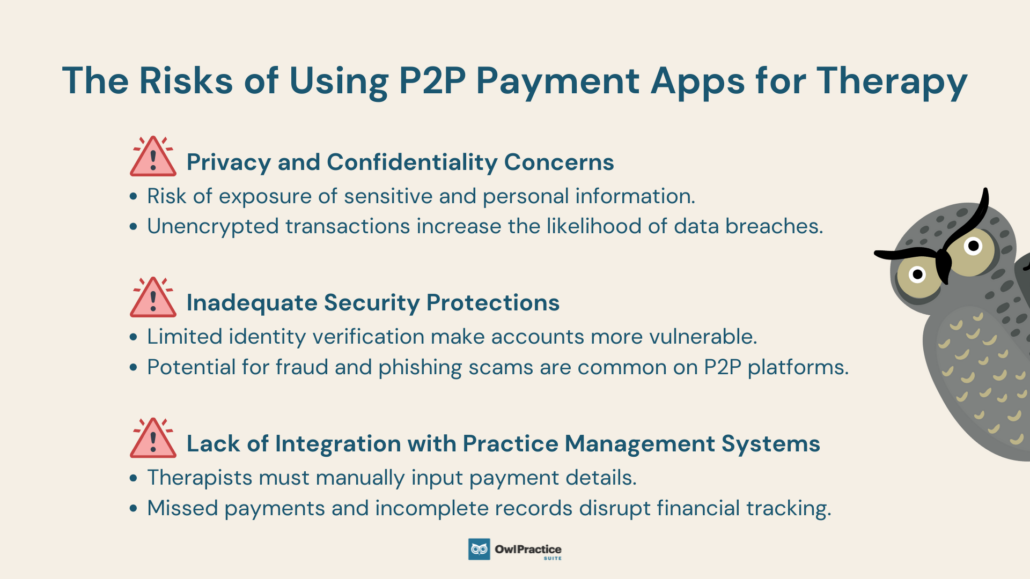As technology becomes a central part of everyday life, peer-to-peer (P2P) payment apps have gained immense popularity for quick and convenient transfers. But while these tools are suitable for personal transactions and some small businesses, they present substantial risks for mental health professionals. For therapists, choosing secure, compliant payment systems is essential to safeguard their clients’ privacy and to avoid legal and ethical pitfalls.
This article will explore the potential dangers of using P2P payment apps in therapy settings and outline secure alternatives for mental health professionals in the United States.

What Are Peer-to-Peer Payment Apps?
Peer-to-peer payment apps allow users to send and receive money using digital tools tied to emails, phone numbers, or usernames. These popular apps are widely used for their convenience in personal and informal transactions, from splitting restaurant bills to paying rent.
In professional practice, particularly mental health, the appeal of convenience may tempt therapists to adopt these apps for payment. However, there’s a vast difference between using P2P payment apps for casual transactions and using them in a setting that demands high standards of confidentiality and regulatory compliance.
The Risks of Using P2P Payment Apps for Mental Health Professionals
Privacy and Confidentiality Concerns
Therapists are bound to maintain strict confidentiality standards under HIPAA. P2P payment apps, however, lack the robust data protections needed to safeguard sensitive client information:
- Risk of exposure: P2P apps store client names, emails, and payment information, which could be unintentionally visible to others. Additionally, clients will have to download a new app, input their banking information and be responsible for using a secure password or setting up 2 factor authentication.
- Unencrypted transactions: Most P2P services do not encrypt transactions to HIPAA standards, increasing the likelihood of data breaches.
For therapy practices, any breach in privacy can harm client trust and lead to legal issues, making P2P apps unsuitable for clinical transactions.
Inadequate Security Protections
Many P2P payment apps have minimal security protocols, making them susceptible to hacking, fraud, and phishing:
- Limited identity verification: Most P2P apps verify users only through email or phone, making accounts more vulnerable to identity theft and unauthorized transactions.
- Potential for fraud: Fraud and phishing scams are common on P2P platforms, where security measures are less stringent than in professional payment systems.
Therapists risk exposing both themselves and their clients to financial harm by using these apps.
Lack of Integration with Practice Management Systems
Effective practice management relies on the ability to seamlessly track and document all payments and invoices within an Electronic Health Record (EHR) system. P2P apps do not integrate with EHR systems, resulting in:
- Manual tracking and documentation: Therapists must manually input payment details, increasing the risk of errors.
- Organizational issues: Missed payments and incomplete records can disrupt financial tracking and tax reporting.
In contrast, a well-integrated payment system within an EHR like Owl Practice allows therapists to maintain organized and accurate financial records, ensuring compliance with industry standards.

Compliance Issues with P2P Payment Apps
Non-Compliant with HIPAA Standards
HIPAA mandates that mental health professionals uphold stringent privacy and security protocols to protect client information. P2P payment apps fall short:
- Lack of HIPAA-compliant features: Since P2P platforms are designed for casual use, they do not meet HIPAA’s encryption and confidentiality standards.
- Client risk exposure: Using P2P apps for client transactions may expose private information, putting both the client and the therapist at risk of non-compliance penalties.
For HIPAA-compliant operations, only professional-grade payment systems designed for healthcare should be used.
Incompatibility with PCI-DSS Standards
In addition to HIPAA, mental health professionals must ensure that financial transactions adhere to the Payment Card Industry Data Security Standards (PCI-DSS):
- Weak data protection protocols: P2P apps don’t adhere to PCI-DSS requirements, leaving client payment data exposed.
- Higher data breach potential: PCI-DSS compliance helps protect cardholder data, which P2P apps do not provide.
A breach of payment data can result in serious consequences for therapy practices, including fines and reputational damage.

Get paid with Owl Practice.
Professional and Ethical Considerations
Damage to Professional Reputation
Therapists must be vigilant in upholding their professional image and commitment to confidentiality:
- Perceived unprofessionalism: Relying on casual payment apps may make clients feel their therapist is not prioritizing privacy.
- Erosion of trust: Trust is paramount in therapy, and clients expect a commitment to security. Using non-compliant payment methods can erode this trust and damage the therapist’s reputation.
Legal and Financial Risks
HIPAA violations carry steep penalties, and therapists using non-compliant payment methods may face fines, lawsuits, or both:
- Fines for non-compliance: HIPAA fines can be hefty and may include legal costs.
- Financial losses from data breaches: If a data breach occurs due to insecure payment processing, therapists could face direct financial harm and lose clients.
Using compliant, secure payment methods is not just ethical but is also necessary to protect the practice from financial and legal fallout.
Secure and Compliant Alternatives for Mental Health Practices
To avoid the risks associated with P2P payment apps, mental health professionals can opt for secure and compliant alternatives.
Integrated Payment Solutions in Secure EHR Systems
Secure EHR systems, like those offered by Owl Practice, are designed specifically for mental health professionals. These systems provide:
- Confidential payment processing: Integrated EHR systems encrypt sensitive data to meet HIPAA standards.
- Automated tracking and reporting: Payments are automatically recorded, reducing administrative time and minimizing errors.
- Ease of use for clients: Clients have access to payment information and input via a client portal. Clients don’t have to call in financial information over the phone or send it through email — they can add their own forms of payment and get charged and invoiced automatically.
An integrated EHR payment solution ensures that therapists can manage client payments professionally and in compliance with privacy laws.
Benefits of Using Secure Payment Methods
Adopting secure payment solutions offers multiple benefits for both therapists and clients:
- Enhanced security: These methods minimize the risk of fraud, data breaches, and identity theft, ensuring client data is safe.
- Streamlined payment processes: With built-in automation, secure systems save therapists time and reduce administrative burdens.
- Professional client experience: Providing secure billing methods signals to clients that their therapist values professionalism and prioritizes their privacy.
Conclusion: Moving Towards More Secure Payments
While peer-to-peer payment apps may be convenient, they lack the security, privacy, and compliance necessary for professional mental health practices. Therapists who choose compliant payment solutions, such as those offered through secure EHR systems, protect both their clients and their practice, meeting the highest standards of care and confidentiality.
Mental health professionals should explore secure, HIPAA-compliant payment solutions that prioritize client security and enhance their practice’s professionalism. For a reliable, therapist-focused solution, consider an integrated EHR platform like Owl Practice, designed to help therapists manage payments safely and efficiently.
Reduce clinical administrative tasks and transform more lives with Owl Practice. Owl Practice provides all the tools you need to make your practice successful. Join the thousands of care professionals using Owl to run their practice every day.



